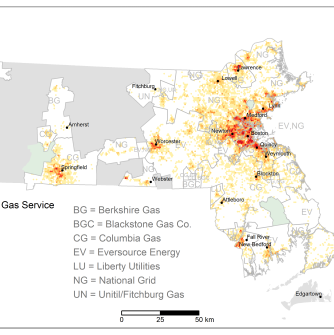| Contact |
Marcos Luna
|
|---|
Geography professor Marcos Luna, working in collaboration with Dominic Nicholas, Director at the Cambridge-based HEET (Home Energy Efficiency Team), published a study showing that People of Color, limited English speaking households, and lower-income households across Massachusetts are more exposed to gas leaks than the general population, and those leaks take longer to repair.
The researchers mapped utility-reported gas leaks for 2019 (pre-COVID) across the state down to the individual address level or street intersection where the leak was reported. They examined how frequently gas leaks of different grades occurred by community at various scales - by Census Block Group, by Census Tract, by City or Town, and by utility territory - comparing the frequency of occurrence to the demographic characteristics of the nearest residents. They also looked at the ages of these leaks, how quickly they were repaired or how long they had been left unrepaired.
The research showed that the 26,000+ gas leaks reported by utilities in 2019 were nearly ubiquitous across Massachusetts. Indeed, at least one gas leak was reported in 95 percent of the municipalities within natural gas service territories, and 91 percent had at least one unrepaired gas leak at the end of 2019. More disturbing, however, the research revealed that these leaks are not distributed randomly or equitably. Race, ethnicity, English language ability, and wealth are the leading indicators of gas leaks exposure. People of Color, especially Blacks and Asians, and limited English-speaking households were more exposed to gas leaks, especially more hazardous gas leaks, than the general population, even when controlling for housing or gas infrastructure density. In addition, these same over-burdened communities experienced significantly older leaks and longer times to repair these gas leaks.
The paper argues that these findings show a clear pattern of environmental injustice. The researchers make recommendations for better reporting of leaks and prioritization of state-designated Environmental Justice communities and other vulnerable communities. They also call on federal authorities to follow Massachusetts' example in mandating detailed and public reporting of gas leaks across the country.
The research paper, "An environmental justice analysis of distribution-level natural gas leaks in Massachusetts, USA," was published in the peer-reviewed journal Energy Policy, and it is open access.
Read or download the full article.
The authors are appreciative of Academic Affairs, the College of Arts and Sciences, the Geography and Sustainability department, and HEET for stepping up with short notice to help defray the costs of open access publishing of this important work.

